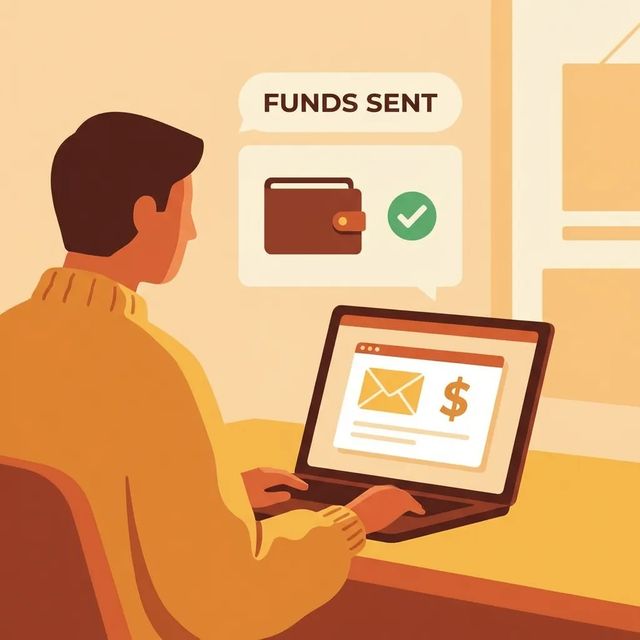Lee County-Tupelo Jail, MS
Explore
Find an Inmate at Lee County-Tupelo Jail, MS
Search for a loved one and send messages and photos in minutes.

Guides for This Facility

How to Send Money to Lee County-Tupelo Jail, MS (FL)
Need to put money on someone's account at Lee County-Tupelo Jail? The jail accepts web deposits only. Money orders are not accepted.
Read Guide
How to Get on an Inmate’s Visitor List at Lee County Jail (and why updates are limited to every 4 months)
Trying to visit someone at Lee County Jail? The visitor list rules matter more than most people realize. Two things to know upfront: inmates can only list five people, and once they submit that list, they can't change it for four months.
Read Guide
Video Visits at Lee County Jail: Step-by-step scheduling, check-in, and what to expect
Video visits at Lee County are straightforward once you understand the limits and check-in process. This guide walks you through scheduling via GTL, checking in at Ortiz, and avoiding common last-minute surprises.
Read GuideAt a Glance
Visitation
- In-person visits are non-contact and limited to 15 minutes.
- Visiting hours are 1:00 PM–4:00 PM and 7:00 PM–8:00 PM.
- Visitors must be on the inmate’s approved visitation list or they will not be allowed to visit.
Communication
- Video visits are available seven days a week from 8:00 AM to 10:30 PM.
- Visitors must register for a direct-pay account at CityTeleCoin and download the City Tele Coin app to use video visitation.
- Inmate phone calls are managed through CityTeleCoin; to register for a prepaid or direct-pay account call 318-746-1114 or visit the CityTeleCoin website.
Sending Money
- Commissary at Lee County–Tupelo Jail is managed by Tiger Correctional Services.
- Commissary orders must be completed by Wednesday before 4:00 PM.
- The facility does not accept money orders for inmate accounts.
Based on official sources and community feedback. Learn how we verify
Topic Overviews
Visitation
Lee County–Tupelo Jail offers non-contact, 15-minute visits by appointment only. You must be on the inmate's approved visitation list and bring a valid photo ID. Hours run 1:00 PM–4:00 PM and 7:00 PM–8:00 PM, with specific pods assigned to certain weekdays (Monday: Pods A & B; Tuesday: Pods C & D; Wednesday: Pods E & F and Male Holding). Sign in at least 15 minutes before your scheduled time, or you won't be allowed to visit. Call (662) 432-2600 to schedule an appointment, then follow staff instructions when you arrive. Keep in mind that visitation is a privilege, and breaking rules can result in suspended visiting privileges.
Read full guideCommunication
Lee County–Tupelo Jail offers video visitation seven days a week from 8:00 AM to 10:30 PM. To use video visits, register for a direct-pay account through CityTeleCoin and download the City Tele Coin app. Phone calls also go through CityTeleCoin. You can set up a prepaid or direct-pay account by calling 318-746-1114 or registering on the CityTeleCoin website. Before using video or phone services, you'll need to create an approved visitor or recipient account and add funds or a payment method through the provider's portal. Video sessions often require advance scheduling and may be limited by facility routines, lockdowns, or disciplinary restrictions. Confirm availability before you plan to connect. Phone calls and electronic communications are typically monitored and recorded.
Read full guideSending Money
Sending money to someone at Lee County–Tupelo Jail comes down to using the right channel and timing it correctly. Commissary is managed by Tiger Correctional Services, and orders must be completed by Wednesday before 4:00 PM. The facility does not accept money orders. For adding funds, use the jail's web deposit option. Processing times vary by method, with online deposits typically posting faster than mailed or retail payments. Some facilities also offer on-site kiosks, walk-in retail payments, or mailed deposits. Funds go to a commissary or trust account for purchases and other charges. Always include the inmate's name and ID so the money routes correctly.
Read full guideCommon Questions
Showing 6 of 9What are the visiting hours at Lee County–Tupelo Jail?
Visiting hours at Lee County–Tupelo Jail are 1:00 PM–4:00 PM and 7:00 PM–8:00 PM. Pods are assigned on specific weekdays according to the facility schedule.
VisitationHow do I schedule an in-person visit at Tupelo Jail?
In-person visits are appointment-only. To schedule, call (662) 432-2600; visits are non-contact and limited to 15 minutes.
VisitationWhat should I bring and when should I arrive for a visit at Lee County–Tupelo Jail?
Bring proper photo ID and make sure you are on the inmate’s approved visitor list. Sign in 15 minutes before your scheduled visit time or you may be turned away.
VisitationWhat are the video visit hours at Lee County–Tupelo Jail?
Video visitation runs seven days a week from 8:00 AM to 10:30 PM.
CommunicationHow do I set up an account to video visit or receive inmate phone calls?
For video visits, register for a direct-pay account at CityTeleCoin and download the City Tele Coin app. For phone calls, set up a prepaid or direct-pay account by calling 318-746-1114 or registering on the CityTeleCoin website.
CommunicationDo I need to pay in advance or schedule a video visit at Lee County–Tupelo Jail?
Yes. You'll need a prepaid or direct-pay account to use phone or video services, and video visits often require advance scheduling. Availability can change due to facility routines or lockdowns, so confirm before you plan to connect.
CommunicationMore Guides
Ready to Connect?
Search for your loved one to start communicating today
Did You Know?
Visits at Lee County Detention Center (Tupelo) are non-contact, 15-minute appointments. Visitors must be on the inmate's visitation list. To schedule, call (662) 432-2600, Monday through Friday, 8:00 AM to 5:00 PM.
This guide is compiled from official facility documentation and community feedback. Learn how we verify
